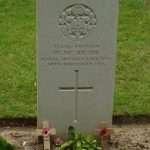Odd things can become obsessions – like finding Private Willie McBride.
Since teenage years his name has been part of a personal remembrance of the horrific slaughter of the Great War. Indulged by a long suffering family, two days of the summer holiday were spent on the Western Front, visiting site after site and cemetery after cemetery; Willie McBride was amongst those whom we sought
Perhaps the song The Green Fields of France, the words of which have echoed through the memory for more than thirty years, was not about a specific person, but if there was someone who matched the description, then it could be personalised. Each year in November, snatches of the tune come back:
Well, how do you do, Private William McBride,
Do you mind if I sit down here by your graveside?
And rest for awhile in the warm summer sun,
I’ve been walking all day, and I’m nearly done.
And I see by your gravestone you were only 19
When you joined the glorious fallen in 1916,
Well, I hope you died quick and I hope you died clean
Or, Willie McBride, was it slow and obscene?
The Commonwealth War Graves Commission website gives three W. McBrides as dying in 1916, but one of those has no grave, his name being on the arch at Thiepval with over seventy thousand others, blown to pieces or disappeared in the mud. The other two are in the cemetery at the little village of Authuille.
A simple memorial at the church of Authuille brought tears to the eyes. It commemorated three Glasgow Pals battalions, the 15th (Glasgow Tramways), 16th (Boys’ Brigade) and 17th (Glasgow Commercials) battalions of the Highland Light Infantry.
The Boys’ Brigade! These soldiers were barely more than were kids.
The inscription reads:
From a hundred lonely graves in that foreign field – from the spots where they fell, and which now are sacred spots for us – our dead men are asking us when we mean to erect that monument From trench and shell hole where death found them, their voices call – young, musical voices, the voices of boys still in their teens, the voices of martyrs on life’s threshold. Scarce a wind can blow that will not waft to these voices. And they ask a better Britain as their monument. They ask it of you and me. Shall we not go from this place resolved to build it?”
The wreath beneath it was from the Boys’ Brigade, ninety years on from their predecessors being cut down in their hundreds, they still come back to remember.
The cemetery is reached by a lane passing through people’s gardens. It is a beautiful wooded valley and in August it was hard to believe that this place was once a vision of hell on Earth.
There were two William McBrides in this cemetery, the first, according to his gravestone was 21. The second had no age, but there being no other Willie McBrides who died in 1916 and who now lay under the green fields of France, this, for me, would be Private William McBride at whose grave we could pause and ask questions.
I felt awkward having brought no wreath or flowers, not even a poppy, so Private William McBride, I hope you will accept my tears and few words instead.
